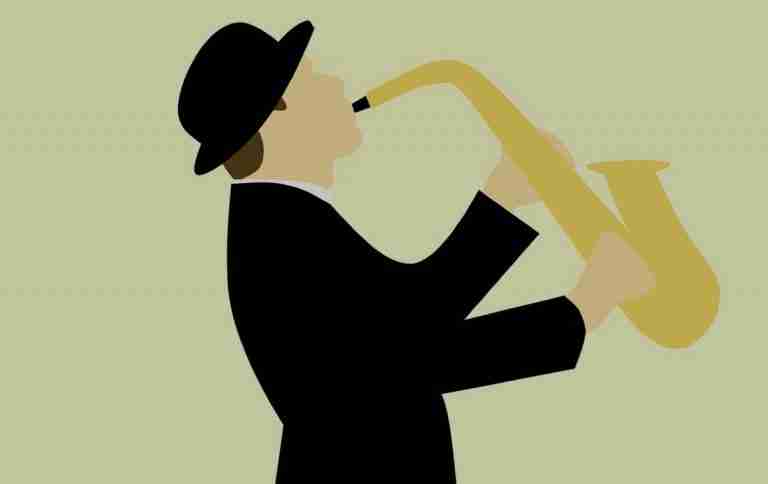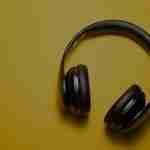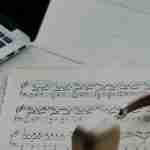Every single person who wants to play jazz starts out as a beginner. There’s no way around it!! And over the first couple years of learning how to improvise, only a small handful of beginners develop quickly toward the player they want to become…most actually have difficulty improving and never really get out of the beginner stage…
Why is it that only a select few make huge leaps forward in the first couple years of practicing jazz, while most beginners get left in the dust? Do some just have more natural talent or better teachers? What sets these high-achieving beginners apart??
While talent and teachers can definitely help beginners, it’s not the determining factor that allows them to excel quickly…It actually goes back to the practice habits and attitudes that they form early on in their jazz improvisation journey.
Unconsciously, we create habits and attitudes that govern our musical progress, and for better or worse, we become a product of our daily practice and musical mindset.
Little do we realize that the misconceptions and holes in our game plan early on will inevitably hurt our long term progress as a jazz improviser
Beginners who excel fast avoid the practice habits that cripple their long term progress, whereas the majority of beginners fall right into the traps, repeating the same poor habits every single day…
Years pass and these habits grow even stronger, causing us to get frustrated and demotivated. But the good news is, these mistakes can be corrected right now…All it takes is an open mind and a little dedication.
So whether you’re just starting out, or if you’ve been practicing jazz improvisation for a while but just can’t seem to get where you want to go, identifying and fixing the mistakes we’re talking about today will help you improve much faster!
Here are 15 common mistakes beginner jazz improvisers make and how you can fix them right now…
1. Beginners Put theory above all else
When we first start to improvise, we’re over loaded with music theory…things like scale choices, chord symbols, and other new concepts flood our brain.
Nothing makes total sense, but we put our faith in the jazz rules that be, trusting that scales and jazz theory will be our savior and guide us toward improvising the way we want to.

Unfortunately, theory is only ONE piece of the puzzle – a piece that supports and explains other essential pieces like ear training, jazz language, tunes, and more…
Think of theory as a framework that helps you answer the question “why?”
- WHY does this chord follow this other chord?
- WHY does this note sound wrong?
- WHY does this substitution work?
Theory gives us the logical reason of why.
But, theory is not the thing that you use to improvise. It’s one of many…
HOW TO REFRAME HOW YOU THINK ABOUT JAZZ THEORY
Instead of using music theory to improvise, use it to understand the why behind sounds and relationships. You see, music theory is not bad, but in the sea of jazz education today, its purpose has been largely confused.
The purpose of music theory is to explain, understand, and to better conceptualize sound.
Without the “sound” part, theory is just math and improvising is not about doing math…
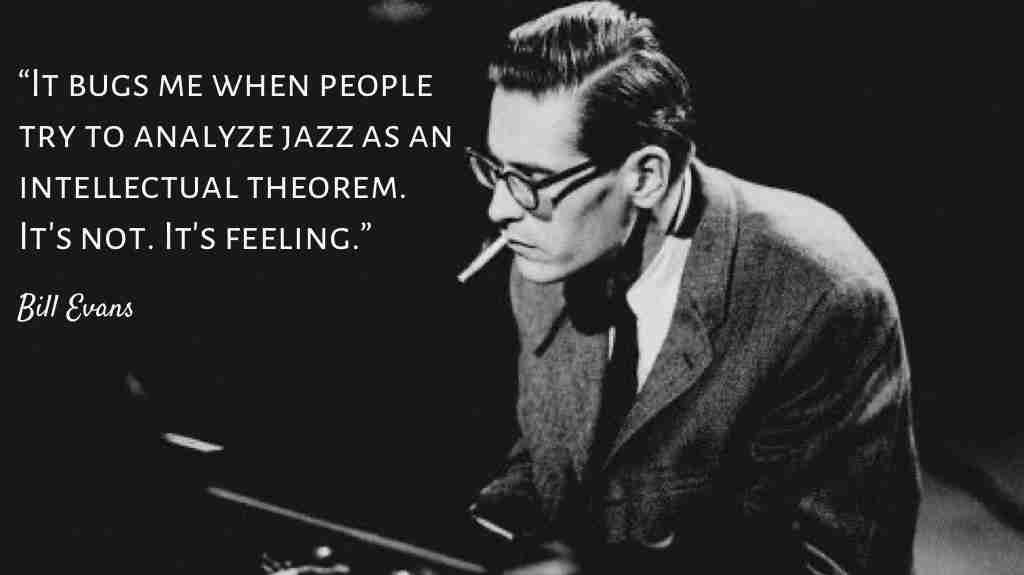
And to use theory in a musical way that supports your musical expression, you need to keep several things in mind…
- Learn to understand jazz HARMONY – Rather than just memorizing chord after chord in a tune, you want to understand the logic behind the progression, the overall story – the why behind every chord. This is no easy feat but with our course Jazz Theory Unlocked you can attain this skill fast.
- Learn to use theory WITHOUT thinking about it – In learning anything, there’s always information that you just need to know, for instance when learning how to multiply, memorizing the times tables up front gives you a working knowledge that you don’t have to think about…learning how to improvise jazz is no different. There are some basic relationships that if you ingrain into your mind, improvising is a whole lot easier. Jazz Visualization is the key to this process and it’s simpler than you think.
- Learn to HEAR music theory – Theory is just a mental exercise if it’s not connected to sound. Most beginners spend most of their time on jazz theory concepts and very little on training their ear. Flip this around and focus more on your ear and less on theory and your entire approach to music will change for the better. It’s actually quite easy to start training your ears like a jazz musician…
- Focus on learning from your heroes – Rather than drown in theory, work on learning from your favorite players instead. It’s no secret. Transcribing is touted as the most direct way to learn how to improvise for a reason…It works!! Just make sure you approach it using your ear rather than simply using an analytical approach. When learning from your heroes, your goal is to absorb their language, intuition, and perspective.
Theory is not the enemy, it’s a tool…
Use it to label sounds, understand relationships, and to classify your knowledge. But make sure to focus on everything that relates to sound even more – activities like listening, ear training, and transcribing by ear.
Take theory down from the high mantle that most beginners put it up on and you’ll hear your music and playing start to open up!
2. Beginners under develop the music in their mind
One of the major side effects of putting theory above all else is that you end up paying very little attention to the music going on in your mind.
And this is a huge mistake because jazz improvisation is all about developing the inner musical voice and expressing it through your instrument – the exercises you practice, the solos you transcribe, the language you learn…
The whole point is to learn to hear this information in your mind and connect it to your fingers so you can use it spontaneously, the same way you speak and interact in a conversation.
With practice, the goal is that your inner musical voice mentally sings the improvisational lines that you want to play, and your fingers naturally play them, as if a radio is playing in your mind and you’re simply listening to it, and playing what you hear.
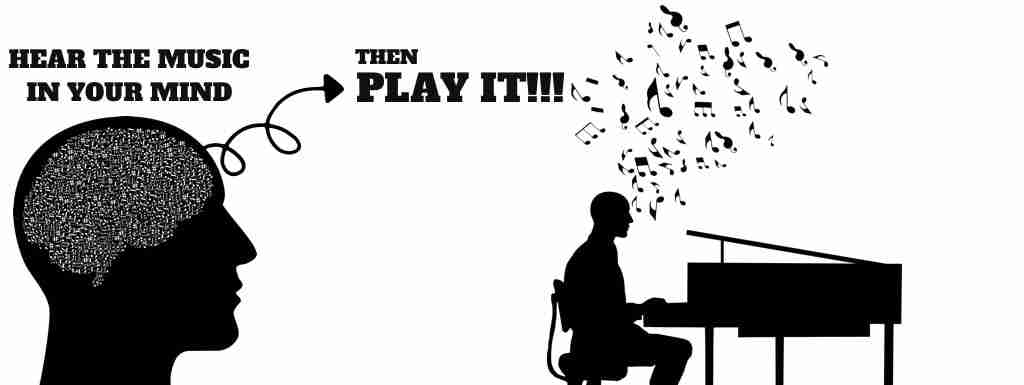
But if you’re so focused on what scale to play or what note to avoid and drowning in theoretical rules, it never even occurs to you to pay attention to this inner musical voice.
As a result, you under develop the relationship between hearing music in your mind and playing it on your instrument.
Of course, nobody is perfect, playing exactly what they hear in their mind…but every great jazz improviser is very aware of this inner musical voice and constantly strives to improve their ability to hear what they want to play, and play what they hear.
HOW TO DEVELOP THE MUSIC IN YOUR MIND
If you haven’t been focusing on the music inside your mind, don’t sweat it! You can easily start to give it the attention it deserves with a few ideas and exercises…
- Start simple! – Many beginners get down on themselves because they can’t hear everything perfectly, but that doesn’t matter at all! Everything is based on simple concepts, so the better you learn the basics, the better you will be. Start by learning to hear your four triads, then seventh chords, and then perhaps progress to the full on Ear Training Method when you’re ready.
- Visualize sound – Mentally connecting to and manipulating sound in your mind is hugely beneficial for any musician. The problem is, we rarely make use of the these tools that are inside our mind. Here are some powerful exercises to expand your aural imagination and mental concept of sound.
- Sing every day – The quickest route to your inner voice is to develop the connection between your mental voice and your actual voice. Spending a little time singing ever single day will help you make this connection. Here’s some ideas on how to develop the habit of singing every day.
It’s time to start paying attention to that musical voice inside of you! Everything comes from there, so the stronger you can make the connection between your inner musical voice, your singing voice, and your fingers on your instrument, the closer you will get to improvisational freedom!
3. Beginners Avoid Struggle
A common mistake beginners make that will forever hold them back is looking for an easy way out. Whether it be using a fakebook, a transcription book of solos, or other crutches…avoiding the frustration and hard work of tackling the material head-on will never give you the results you’re looking for.
And the reason this struggle matters so much has to do with how we permanently store information in our mind.
Sure, we can easily cram for a test and remember a bunch of facts for a few days, but when it comes to jazz improvisation, we want the information we practice to be there for a lifetime, not just a few days…
The key to this permanent retention and recall is the aha moment – you know, it’s that moment where after struggling for hours, a bolt of lightening goes through your head and you exclaim, “Ohhhh, NOW I get it!!”
That’s the moment we’re looking for because these types of aha-moments are so impressionable on the brain and body, both intellectually and emotionally, that the information actually sticks with us.
Simply put, memorable experiences are more easily stored and recalled
And that’s the memorable moment that’s robbed from you when you avoid struggle!! No struggle equals no Aha moments. And no Aha moments lead to less memorable learning experiences.
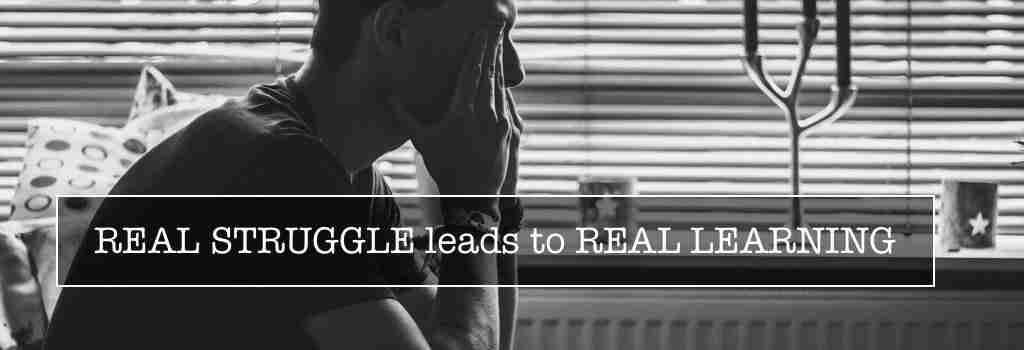
Stop looking for the answers in books or from teachers, and instead, face the struggle in learning tunes, transcribing, and developing as a player.
HOW TO FACE STRUGGLE HEAD ON
Rather than avoiding struggle or shying off when you’re getting frustrated or stuck, move toward it! Realize that the moment when you’re starting to struggle is your opportunity to learn something permanently and make awesome progress.
- Induce the Lightbulb Experience – Every time you push through struggle and reach an Aha moment is when that lightbulb in your brain turns on. You may think that the easy way is what you’re after, but when it comes to this music, you want to learn jazz improvisation the “hard” way. You see, when you take out the shortcuts and face the challenges head on, your understanding goes beyond analysis into something you can actually use in the moment.
- Deal with frustration as it comes – We all have days where we hate practicing or where we’re stuck hitting our head against the wall. Don’t stress it and use these techniques to deal with frustration in the practice room. No matter how much frustration you encounter, you can still turn any practice session into something that moves you forward.
- Focus on retention – Practicing jazz is all about retention. If you can’t keep it in your ear, mind, and fingers after your practice session, then what good is it? Follow this wisdom from Harold Mabern to totally change how you practice and ensure that you leave each day holding onto what you worked on.
It might seem difficult at the time, but the way out is through…push onward through the struggle and your work will be rewarded.
4. Beginners don’t explore & experiment
Learning jazz is all about solving music problems, and you solve these problems by exploring and experimenting…
But more than the act itself, it’s the mindset of exploring and experimenting that matters most…
Every time you walk into the practice room you should feel as though you’re about to solve a new puzzle or unravel a new clue, like a CSI detective on your favorite show
It’s this exploratory mindset that allows you to stumble upon solutions and perspectives you never knew existed.
And, it’s the attitude that keeps learning fun, creative, and interesting…
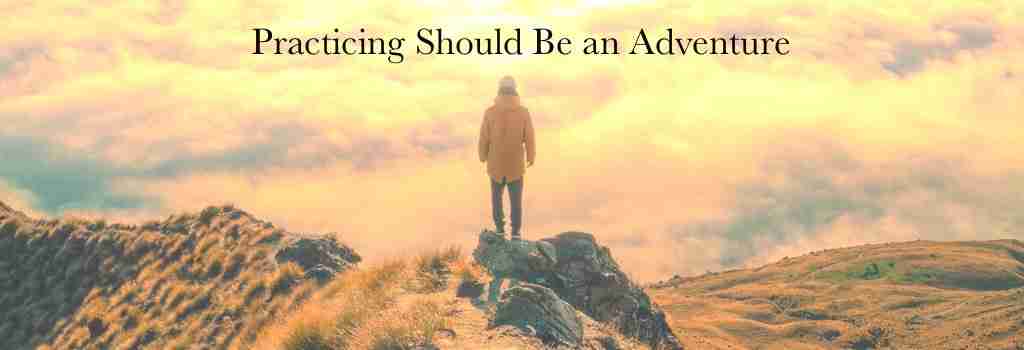
By cultivating this investigative and experimental attitude from the get-go, you’ll learn ten times faster and you’ll learn how to solve musical problems for yourself, rather than waiting for someone to tell you their answer.
HOW TO DEVELOP AN EXPLORATORY MINDSET
To develop this mindset, you have to change your general attitude toward practice. Rather than it being a chore, reframe it at as a fun opportunity in your daily life for growth and discovery.
- Learn to be your own teacher – In most things, if you ask 10 different people a question about how to do something, you’ll get 10 different answers, and playing jazz is no different. Everyone has their own take on how to approach every element of jazz. By learning to be your own teacher, you can take all the information, advice, and opinions you gather about how to play, and come to your own conclusions.
- Create a great practice environment – One thing beginners overlook is the physical space that they practice in. Treat this as your lab, your dojo, or your sanctuary. This is where you’re going to develop your musical self, so spend some time creating the perfect practice environment…a place that you’re excited to go to and spend time in. An environment that makes it easy to learn and have fun.
- Make stuff up!!! – All the great jazz musicians started making stuff up early on in their musical development and you should too! Every solo you transcribe, every line you work on, every tune you learn…make your own exercises and put your own spin on the information. The golden rule though is this…it has to SOUND good to you! In other words, even if the theory works, if it doesn’t sound right, then modify it until it does.
5. Beginners Underestimate Their Individuality
As a beginner, it’s difficult to give yourself any credit…
You’re far from playing your instrument perfectly, essential forms like blues and rhythms changes give you trouble, and learning tunes or remembering changes is not so easy…
But that doesn’t mean that you have nothing to add to the equation.
All your individuality – physical, emotional, spiritual, experiential – all of the unique things that make you you, contribute to your musical voice, even if you haven’t been playing that long.
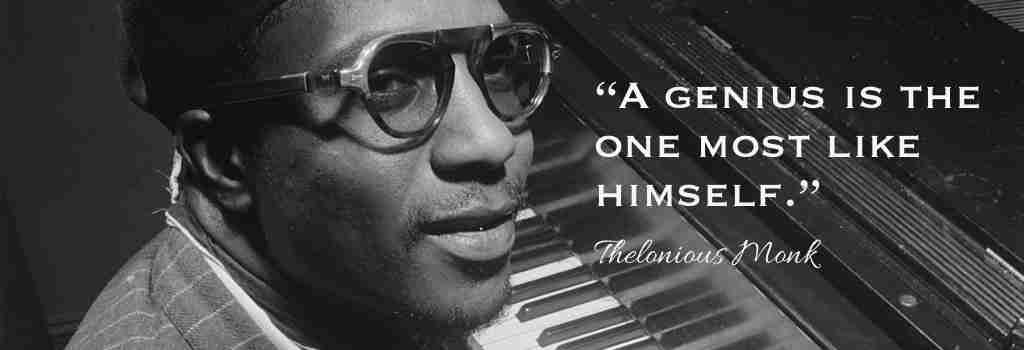
As you develop as a musician, if you keep your individuality in mind, it will help you follow the path to your true sound, not someone else’s. You’ll transcribe the players YOU love. You’ll envision playing your instrument the way YOU want to play it.
And just because you’re far from the getting there doesn’t mean you shouldn’t be steering your playing in the direction you want to go.
Allow your own musical tastes, sound, and idiosyncrasies to influence your goals and practice.
HOW TO TRUST YOUR INDIVIDUALITY
- Learn to embrace your individuality – We’re all very unique, but much of the time we hide our individuality and try to conform to the accepted norm. In jazz though, it’s all about being unique, so let down your guard a little and allow your own quirky imperfections to shine through. With tasteful judgement and practice, these imperfections can actually help define your musical voice.
- Embrace your creativity – Playing jazz is not about following rules or being the perfect image of what you think a jazz musician should be. It’s about expressing yourself, using the jazz language and your own creativity. But to use it, you first have to stop running from your creativity. Embrace it, and watch everything change.
- Trust your musical instincts – We all have natural opinions, tastes, and responses to sound. By developing and following your musical instincts, you’ll be on the path to finding your own voice, which is where you want to come from. Of course your opinions and tastes will change and grow over time, and as they do, so will your voice.
As a beginner, the fundamentals matter the most, but don’t be shy about putting them through your own lens and following your own musical tastes. Remember that you have the opportunity to build your musical self in any direction you desire.
6. Beginners Ignore the jazz tradition
Now, on the other side of the coin, some beginners trust their individuality too much…
They believe they’re so unique that they have nothing to learn from the players that came before them – they consider copying cheating, and fear that by doing so, they’ll sacrifice their sense of individuality.
I can remember being in this stage years ago…
And this is a HUGE mistake, especially as a beginner because the way you learn how to speak the jazz language is through imitating, understanding, and absorbing the music of your heroes.
The history of jazz is filled with greatness…
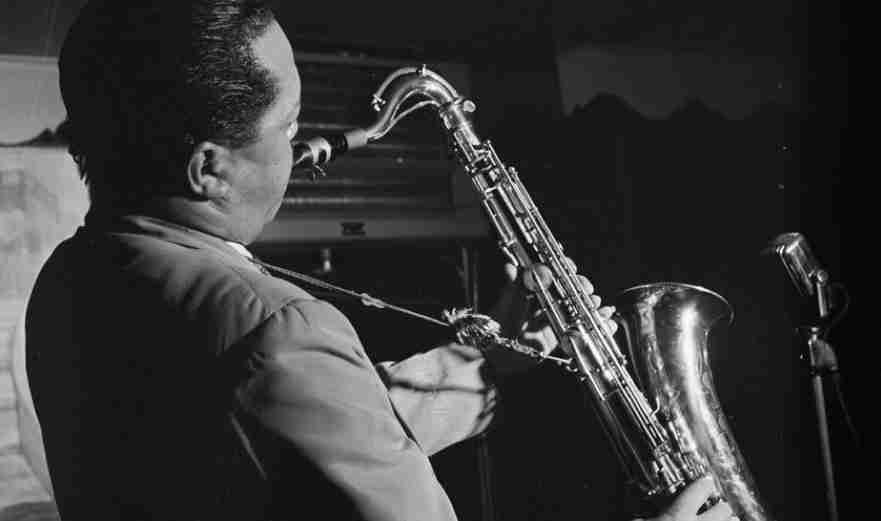
There are more musicians, tunes, and approaches then anyone could hope to tackle in a lifetime, but as an aspiring jazz musician, ignoring them is the absolute worst thing you could possibly do!!
In jazz, everybody comes from somewhere. Even the great Charlie Parker and John Coltrane learned from what came before them. Do yourself a favor and start digging deeper into the history of jazz and specifically the players on your instrument.
Start making it daily habit to get deeper into the jazz tradition – the repertoire, essential forms, styles, players, and more!
HOW TO LEARN FROM THE JAZZ TRADITION
Surround yourself with the history of jazz. Immerse yourself in it and learn all you can. The closer you put yourself to the history of the music, the more jazz “secrets” you’ll uncover.
- Watch jazz interviews – A great way to hear, see, and connect with the attitudes and ideas of great jazz musicians is by watching them get interviewed. There are many priceless jazz interviews to watch that will inspire you and give you insight into how these musicians thought and spoke.
- Work on essential jazz forms – Most tunes in jazz are built on essential tune forms. When you learn these basic forms, it becomes much easier to understand how the jazz standard repertoire evolved and developed throughout jazz history. And, make sure to study two of the most crucial forms to jazz, The Blues and Gershwin’s I Got Rhythm Changes.
- Learn from your heroes – Find the musical personalities that you enjoy the most and emulate them. Learn to hear and feel time the way they did. Internalize their sense of melody and swing. Figure out what it is that you love about them and absorb it into your own playing through the process of transcribing. No other way will you connect with the jazz tradition on such a deep and personal level.
7. Beginners Don’t Fall In Love With Jazz
Jazz is just like learning a foreign language…you can treat it as homework, or let it become your passion and have fun with it.
Which one sounds like it be more productive and enjoyable? Obviously, if you’re not treating it like homework, it’s going to be a whole lot better!!
But for some reason, so many beginners put jazz into a little compartment of their life, where it sits closer to that of work or school, rather than play and fun.
To play jazz you really have to fall in love with it. Listen to it in your spare time and allow it to affect you.

If you want to play jazz, then make it a central part of your life. Let it become your passion – something that gives you constant joy and excitement.
HOW TO FALL IN LOVE WITH JAZZ
To fall in love with jazz, listen to it every single day. Get obsessed with the music…Do anything you can possibly do to connect deeper to the music…
Get interested in the lives of jazz musicians and what they were like. Put a poster of your favorite player up on the wall of your practice room for inspiration. Most importantly, go see jazz performed live!!
Here are a few more ideas to take your love for jazz up a notch…
- Learn to listen actively – Not all listening is created equal. Learn to listen to jazz actively through selective listening and make it a point to fill your spare time with focused listening. Pack your phone with all your favorite musicians and listen during your commute. You’ll be amazed what this does for not only your love for the music, but also for your ears and jazz concept.
- Read books about jazz – One of the best ways to peer inside a jazz musician’s life is to read about them. Art Pepper’s chilling book and The Making of Kind of Blue are two of my favorites that transport you to another time. Try substituting your typical fiction novel or your before-bedtime TV show with a chapter from something like this instead.
- Connect to the music – In today’s world, you can connect to the music no matter where you are through piles of archived performances, NPR shows, and streaming concerts.
Falling in love with jazz is key to improving rapidly and enjoying the process. As Harold Mabern used to say to us all the time, “Be greedy for the music!”
8. Beginners Avoid Acquiring jazz language
Jazz language is the crucial element to hearing how melody and harmony are interconnected, and how jazz musicians “speak” over the common harmonic scenarios that arise time and time again in the most played jazz standards.
But rather than acquire jazz language, beginners often stick to the scales they were taught to use over each chord and randomly mix up the notes, hoping that something eventually good comes out…

Scales don’t come with melodic instructions, so crafting strong lyrical melodies over chord changes, in the tradition of the jazz greats does not magically happen by mixing notes up in a scale.
To get beyond scales, a great place to start is by gathering jazz language for each of the basic chord types.
HOW TO START ACQUIRING JAZZ LANGUAGE
It’s simpler then you might think to start acquiring jazz language. You just have to start somewhere and trust the process. As you begin to get language keep these these things in mind…
- Know the difference between licks and language – Sure, most people think they’re the same, but the word lick seems to have a negative connotation because it implies a very shallow knowledge, where as learning language encapsulates a whole process and understanding. If you know the difference between licks and language, it can help you understand what it is you’re trying to acquire, and how best to acquire it.
- Get language for all basic chords – Acquiring specific language that you like for major, minor, dominant, and half diminished chords will give you a starting point for crafting your own lines in real-time. While it may seem tedious, these jazz language fundamental building blocks will give you a foundation to build upon. It takes time and dedication to build up an arsenal of basic language for each chord, but it will greatly pay off.
- Constantly expand your jazz language – Just like learning a second language, you want to be constantly adding to your jazz vocabulary and expanding your knowledge of jazz language. This Premium Guide on language explores how to do this in-depth, walking you through step-by-step on how to do it.
Acquiring fundamental jazz language for the basic chord types can’t be emphasized enough. With it, you’ll begin to connect melody and harmony in a way you never thought possible. But without it, you’ll remain in the dark, wondering how all your favorite musicians are playing such amazing jazz lines so effortlessly.
Start acquiring language now, and even within a few weeks, you’ll begin to see it change your approach for the better.
9. Beginners Never Really Learn a Tune
Playing tunes is what jazz is all about…
When you think about it, the whole point of all your practice and hard work is to perform tunes the way you want to, so learning tunes is paramount to the craft of a jazz musician.
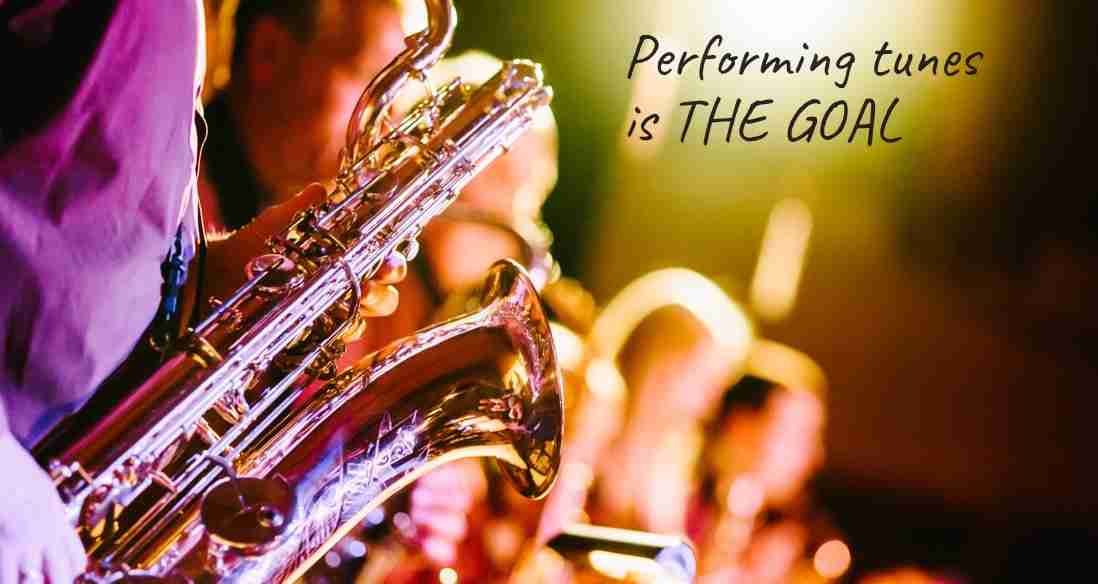
But what does it actually mean to learn a tune?
Most beginners get caught in a vicious cycle that goes something like this…
- Buy a play-along set for a few tunes
- Open up the play-along set
- Turn on the background track
- Look at the sheet music
- Solo…over and over and over and over…
If you want a recipe to stay a beginner forever, that’s it!!
Learning tunes is more than memorization…it’s internalization through study, repetition, and obsession…
If you want to excel past the level of a beginner, you have to significantly alter your process and definition of what learning tunes means.
HOW TO START LEARNING JAZZ STANDARDS LIKE A PRO
From now on, “learning a tune” should mean that you know the tune so well, you can mentally hear the chords playing in your head – You can hear the bass line. The piano. The drums. The whole band playing mentally in your mind.
And the melody of the tune means something special to you and you can hear how the melody notes lay over the harmony…
The chords make logical sense to you. There’s no question about why each chord is there – each one naturally progresses to the next in your mind, and you can hear and understand the voice leading.
If this seems a bit over the top for you, that’s okay! Learning a tune takes time, focus, and an entirely different process than you’re probably used to, so don’t be in a hurry, and slowly add tunes to your repertoire in a much deeper fashion.
Here are some ideas to help you get started tackling the jazz standard repertoire with success…
- Avoid these BAD practice habits – No matter how much you practice, bad habits will eat away years of valuable practice time, turning it into nothing but wasted time, so make sure you avoid these terrible practice habits and keep your focus where you want it! Don’t fall into the trap of turning play-alongs on and soloing endlessly. This is probably the number one bad practice habit of beginners when it comes to learning tunes.
- Understand how to build your repertoire – Use this blueprint for building your repertoire to get a grasp on what building your repertoire actually means. Then start doing it with these 10 key tunes. Remember that it’s NOT a numbers game!! It’s better to really learn one tune perfectly than 100 in a poor manner. Many elements within a single jazz tune will be repeated in every other tune you learn, so spend the time nailing these things the first time around.
- Develop a great tune learning process – In this detailed lesson on the great jazz standard It Could Happen to You we’ll show you a great process to add a tune to your repertoire. Follow it closely and use it as a model to create your own stellar tune-learning process. In time, you’ll easily be able to add any tune to your repertoire in an easy and permanent way that engages your ears the whole time!
Remember…most jazz standards repeat the same basic progressions over and over. So, if you learn one standard really well, using your ear and jazz language, you’re going to go much further in the long run than if you rely on a play-along set and sheet music.
Reinvent your process for learning tunes and you’ll never want to go back to how you did things before…
10. Beginners Don’t Make Use of The Piano
For all you non-pianists, it’s time to invest in a skill that will help you unlock chords, progressions, tunes, harmony, and composition…
I’m talking about playing the piano.
Getting basic piano skills is not only easy, but it will allow you to understand how things work in jazz on a whole new level.
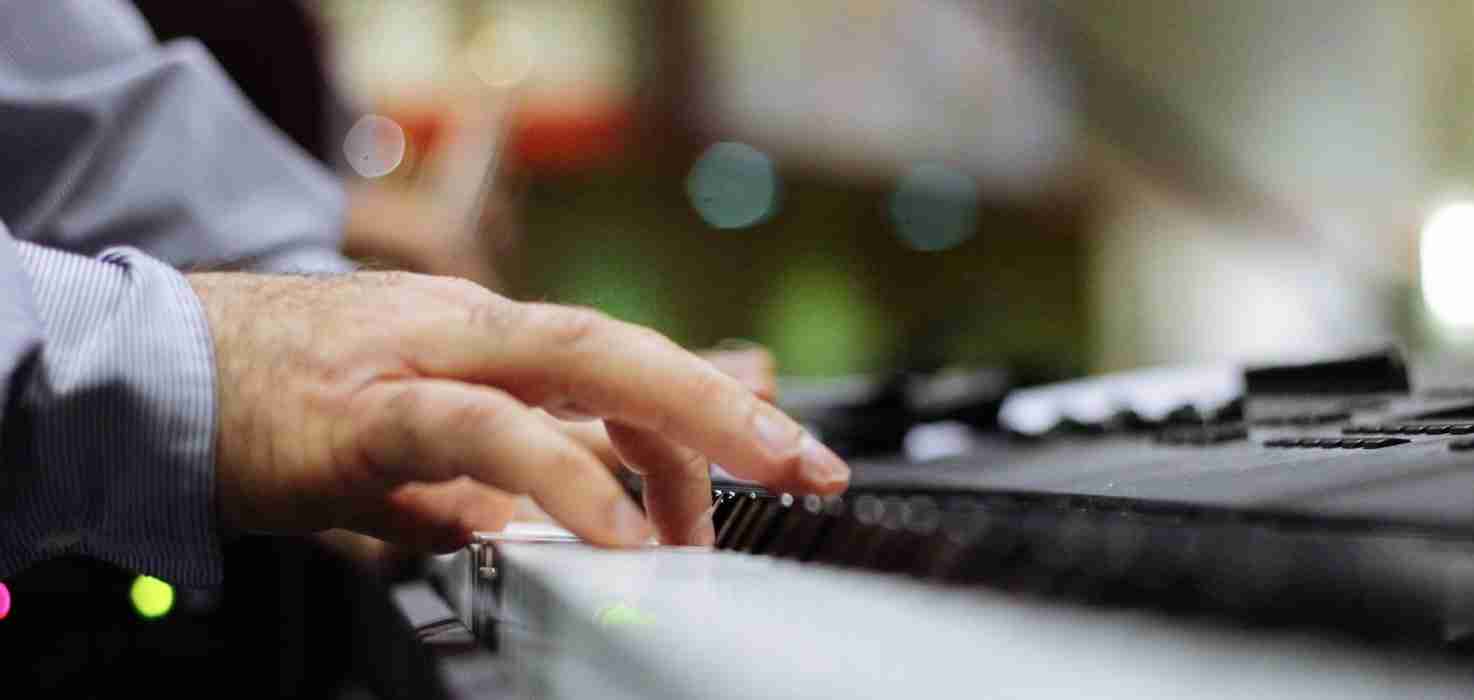
In fact, Phil Woods used to say that if you can’t play a tune at the piano, then you don’t know it!!
We’re not talking Oscar Peterson like skills here…all you need to know are the note names of the piano keyboard and to be able to play simple two-note chord voicings.
It’s pretty straightforward and you’ll be thanking me for getting you on this path sooner than later…
HOW TO START BUILDING YOUR JAZZ PIANO SKILLS
Building your jazz piano skills as a non-pianist may seem a bit intimidating…As if playing your own instrument weren’t difficult enough!!
But the thing is, developing basic jazz piano skills will make it easier to play jazz and solo over chord changes, so don’t sweat it and know that if you put in even a few minutes each day at the piano, playing jazz will be much easier…
- Buy a cheap keyboard – One of the most common excuses to not learning the piano is, “I don’t have a piano!” Well, that’s no longer an excuse because you don’t need a Steinway in your living room anymore…you can easily pick up a little affordable midi keyboard online today. I take this keyboard everywhere I go! Or, you can grab a larger midi keyboard for your practice room. The important thing is not how good your keyboard is, but that you have one.
- Get basic piano skills – Before you do anything with the piano, learn how to develop basic piano skills using two-note and root position voicings. A week spent on these exercises will easily give you the basics you need. Once you can do the basics, start learning how to play jazz standards at the piano.
- Get The Jazz Piano Book – A great book that goes through the essentials of jazz piano is called The Jazz Piano Book. If you want to take your jazz piano skills beyond the basics, this is a great resource to get you started.
Go buy your keyboard and start playing the piano! From tunes, to theory, and ear training…It really does make jazz improvisation much more clear.
11. Beginners Gloss over unknown chords
What do you do when you encounter a chord that doesn’t make sense to you?
Do you quickly move on? Or, do you break it down…go to the piano…figure it out and study exactly what the chord is made up of and how each note sounds against it?
Most beginners, and most everybody practicing jazz, when they encounter a chord they don’t know do the first of the two scenarios – they just fake it.
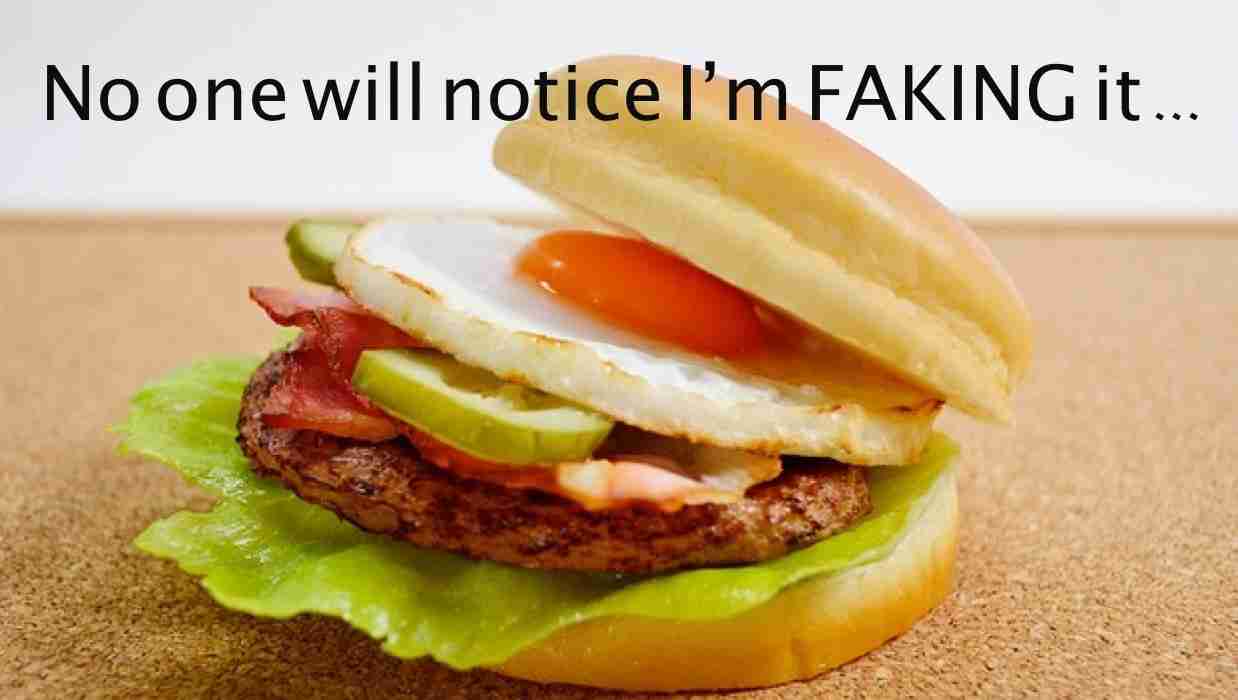
At best, they approximate the chord sound by finding a scale that they think works for the chord and then they move on…but this is a terrible habit to get into…
You want to be a part of the second camp, the curious jazz musicians that pull the chords apart that they don’t understand, and study them until they make sense
This is how you grow and develop quickly because jazz standards repeat the same chords over and over – you’re bound to encounter that same chord again very soon, so learning it the first time you encounter it will continually pay off.
HOW TO STUDY JAZZ CHORDS YOU DON’T KNOW
The next time you encounter a chord that makes you stop and say, “Whaaattt is that???” Instead of fumbling over it, stop for a moment.
For the next 20 minutes, deconstruct the unknown chord until it’s clear as day.
First and most importantly, If you don’t have a recording of where the chord happens already, find one… Chords are sounds – they’re meant to be heard. And once you have a recording, you’re ready to get started.
- Get the right tools – It might seem ridiculous, but the right tools for transcribing jazz make a huge difference. Not everything on a jazz recording is easy to hear. Sometimes the bass line is difficult to make out, or the chord voicing isn’t super clear. A great set of headphones and Transcribing Software make all the difference.
- Use the fundamentals of ear training – If you can’t hear what’s going on, figuring out a sound is going to be quite challenging. But, if you have the fundamentals of ear training at your disposal, you won’t have to work too hard to figure out what it is you’re hearing. In general, any chord you don’t understand will be a modification or combination of other chords you do understand.
- Use your piano skills – This is where your piano skills are more than necessary! When you run into a chord you don’t quite understand, use your piano to play against the recording and help you match what the pianist is doing. Once you can match the chord voicing, try soloing over the chord to hear what each and every note sounds like against it.
Encountering a chord you don’t know can feel like seeing an alien. But don’t get discouraged…it’s very likely that it’s something very simple and you just haven’t seen it notated that way before, or heard a musician voice it in this particular way.
Do your best to understand what the chord symbol means, why it’s notated that specific way, and why it sounds the way it does. With some study, you can transform any unknown chord into something you easily understand.
12. Beginners Don’t listen to instruments besides their own
When you’re starting out, what you’re playing is all you can think about – It practically takes 110% of your mental, aural, and physical capacity to just keep your place while you solo!
Naturally, you don’t have the room in your brain to think about or hear what the other instruments in the band are doing.
And this same type of listening usually carries over to when you listen to recordings – you zero in on your instrument and ignore everything else.
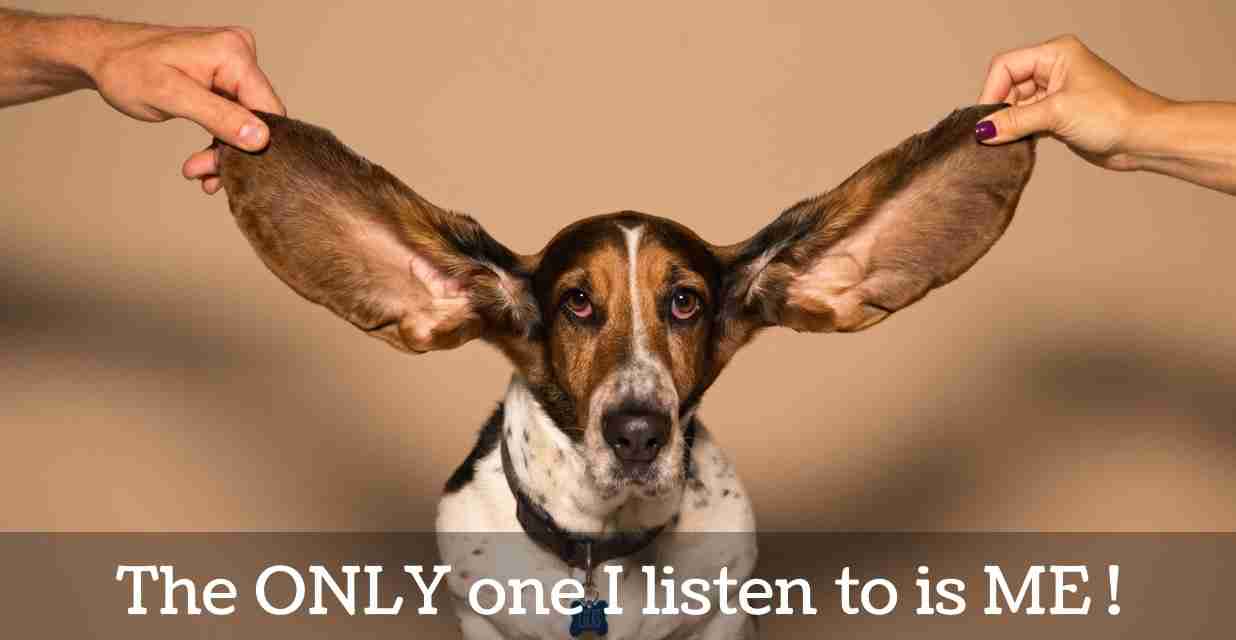
But jazz is not just about what you play. It’s about how what you play fits into the context of what everyone else plays, the combination and interaction between everyone in the band.
So, it’s absolutely necessary to start listening to each instrument in the band and understand their particular role in the music.
HOW TO LISTEN TO THE WHOLE BAND
It’s easy to start listening to the rest of the band. But, the challenge lies in being able to listen to the rest of the band, while at the same time, continuing to listen to yourself and develop your solo the way you want to.
It’s this multi-level listening that you want to start developing…
- Listen to others – Learn to actively listen to instruments besides your own when you’re listening to a recording. Make it a game…the first chorus, listen to your instrument. The second, listen to the bass. The third, the drums…and so on until you’ve listened to each instrument individually. Then, try focusing your listening attention on pairs of instruments, like drums and bass. Keep experimenting until it becomes natural to listen to every instrument in the band.
- Learn to hear bass lines – Being able to clearly hear the bass line is important to your overall understanding of chords. Take a look at this lesson where we outline the bass line and try doing the same thing on a tune you’re working on. Listen to the bass line and actually write it out so you can see exactly what they’re doing. This exercise will give you new appreciation for bass players.
- Listen to drummers – One of the primary aspects of jazz that sets it apart is the swing feel of a good jazz drummer. No other music uses a feel or beat like this. So, first, do some rhythmic ear training to get your ears used to hearing rhythmically. Then, put on some of your favorite recordings and zero in on the drummers. Pay special attention to the rhythms they play and the accents they use.
Jazz is all about listening, so start to make it a habit to listen to more than just yourself. Hear both the context of the whole band and how you fit into that context to take your playing to the next level.
13. Beginners Give Rhythm and Melody a Backseat
This is one of those mistakes that even professional musicians tend to make…
As a jazz musician, it’s easy to get carried away by the intricacies, beauty, and complexity of jazz harmony. So much so that we often forget that the other elements of music even exist!!
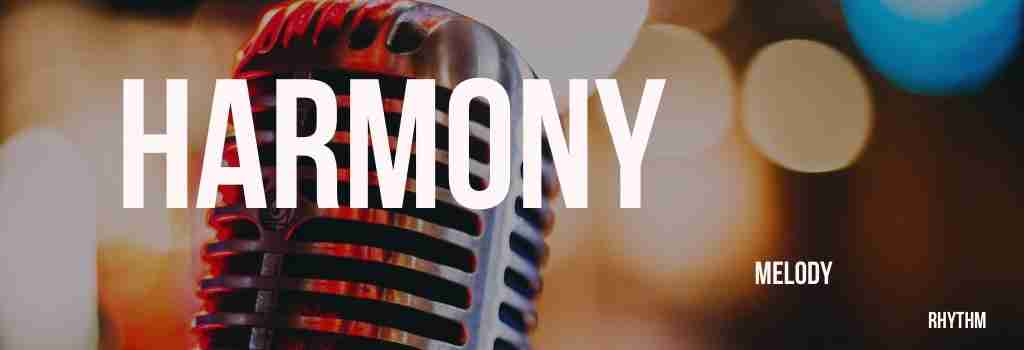
Remember…harmony is only one part of music. Equally, if not more important, are rhythm and melody.
When you’re feeling stuck or bored with your playing, try shifting your attention away from harmony and instead focusing on melody and rhythm.
Here are a few ways to go about moving in this direction…
- Transcribe for rhythm – Most of the time when we’re transcribing, it’s all about the notes. What alterations are they using? What cool harmonic concepts are they applying? But more often than not, it’s the rhythms that actually make the lines exciting. Try transcribing the specific rhythms from a solo that you like and seek to understand what rhythmic concepts and ideas they make use of.
- Learn to craft strong melodies – What does it mean to craft a strong melody? What characteristics do strong improvised melodies have? What devices accomplish this? With these 5 simple melodic concepts, learn to make simple melodic statements and phrase in a way that communicates to the listener.
- Work on phrasing – Jazz phrasing is often left by the wayside in favor of advanced harmonic concepts. But you can learn to phrase like a pro with just a few exercises.
Harmony is important, but don’t make the beginner mistake thinking that it’s more important than rhythm and melody. Develop all three and you’ll never be bored with your playing.
14. Beginners Trust The Changes in The Real Book
The Real Book has become a staple in how to learn jazz tunes. In fact, many beginners can’t fathom how they would possibly learn a tune if it weren’t for the Real Book.
Unfortunately, it’s littered with incorrect chord changes, bizarre substitutions, and alternate chords that will have you conceptualizing tunes in crazy ways that make little logical sense. The worst part is, you won’t even know it.
The truth is, you can easily build the skills to learn tunes directly off recordings and if you don’t want to get rid of The Real Book entirely, you can always use it as a reference – use it to compare what you’re learning from recordings and you’ll see just how incorrect or misleading some of the chord changes in there actually are.
HOW TO BURN YOUR REAL BOOK
- Get a trash can
- Put Your Real Book in it
- Light it on fire (Disclaimer: This is a JOKE. Don’t actually do it.)

All joking aside, the Real Book and other charts are a fine place to start – we all tend to start there and there’s nothing wrong with it! So don’t think that we’re telling you it’s the worst thing you can do, or that it will ruin your playing.
But over time you want to learn how to use your ear to figure out how the chords to a tune actually fit together and why each chord is there.
- Get away from the Real Book – There’s nothing wrong with using the Real Book when you’re starting out. Pretty much everyone does and it’s not a bad place to start. But, over time, try to peel yourself away from it and instead use your ear to learn the changes and melody of any tune you want to learn. There are a whole lot of reasons you don’t want to be a Real Book Player, so gradually make a goal to use it less and less, until eventually, you don’t need it at all.
- Find out how good your ears are – Everyone talks about ear training, but few people know where they actually stand. How good are your ears? Do you know? Here’s a great ear training test we designed to help you figure out where you are, so you can best determine how to get where you want to go. Take the test honestly, record the results, and devise a plan of how you’re going to improve your ear over the next few months.
- Reinvent your process for getting chord changes – While it may seem intimidating, learning tunes directly from the recording is just like anything else…it gets easier the more you do it, so the sooner you bite the bullet, the sooner you’ll be able to do it. Download this free guide on how to learn chord changes directly from the recording, and get to work!
15. Beginners Practice too many things at a time
It’s true. When you’re learning jazz, it can seem like there are a million things you have to know…
And as a beginner or even an intermediate player, you probably have this overwhelming sensation of needing to catch up, always hurrying and packing more and more into your daily practice sessions.
But here’s the thing…What you practice is only as good as what stays with you after the practice session…
And if you’re quickly moving from topic to topic, how much can really stay with you?
In my experience, not much.
Instead, focusing on one thing at a time will not only help your retention, but it will greatly simplify your life.
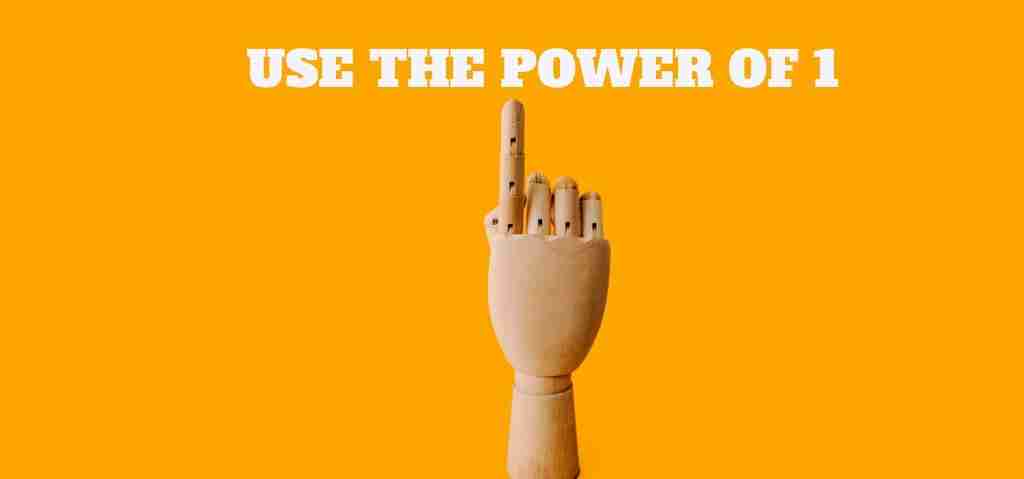
A whole practice session could be working on one tune or even one small piece of a tune! It could be one transcribed line, or learning how to improvise with that line. Or it could be a combination of a tune you’re working on with some of your current vocabulary.
Whatever it is, make it small and work on it until you master it! This way of practicing will help you make small, daily, permanent gains, that build your playing from the ground up.
HOW TO SIMPLIFY YOUR JAZZ IMPROVISATION PRACTICE
- Focus on ONE thing – I hear students all the time talking about everything they’re practicing and I think to myself, that’s crazy!! If you’re skipping around to ten different things during your practice session, nothing is going to stick with you. Use the power of one and really get deep into it.
- Use time blocking – Do you ever go into the practice room for hours, and when you leave, you wonder what you did the whole time? If you can barely remember what you were doing, that’s a sign that you’re practicing in a sporadic unplanned way that likely will yield very little results. To combat this, use time blocking to learn specific techniques and concepts that you want to master. This strategy will help you use your time more efficiently and practice more effectively.
- Understand what to practice for jazz – One of the most common problems is not knowing what to practice and how everything in jazz improvisation fits together. When you grasp the various pieces of what you need to work on and how they’re all connected, practicing jazz makes a lot more sense.
Whether you’re a beginner or professional musician, there’s no need to be overwhelmed and feel like you need to practice so many things each session. Focus on less, take your time, and reach a point of clarity and ease with everything you practice.
The Common Mistakes Beginner Jazz Improvisers Make
Being a beginner jazz improviser should be fun and rewarding…but sometimes it can feel like you’ll be a beginner forever. The good news is, most beginner problems go back to one of the things we talked about today.
So, by finding these mistakes early and correcting them, you’ll avoid years of frustration and instead be able to focus on developing yourself as a musician, moving beyond the beginner improviser stage.
Remember, nobody is perfect and even professionals like myself still make these mistakes, so don’t be too hard on yourself. Simply use each mistake as an opportunity to develop your playing and make huge improvements in a short amount of time!!
